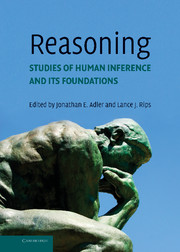47 - Reasoning across Cultures
Published online by Cambridge University Press: 05 June 2012
Summary
In 1931, A. R. Luria traveled to rural Uzbekistan with a question: Is thinking influenced by the social and cultural environment? The fieldwork he did there (Luria 1976) was likely the first attempt to answer this question using methods of experimental psychology. Rural folk in Uzbekistan were at that time in the midst of a socioeconomic transition that involved, among other things, the collectivization of agriculture and the growth of schools and literacy. Luria saw in this a natural experiment. He found groups of participants with different levels of involvement in this transition – including different levels of schooling and literacy – and gave them a variety of cognitive tasks. Some of these were designed to elicit deductive inferences from premises like “precious metals don't rust” and “gold is a precious metal.” Luria found that subjects with no formal schooling often balked at such problems, rejecting the premises and saying, for example, that “one can speak only of what one has seen.” In contrast, subjects who had been to school were more likely to use the hypothetical premises to draw conclusions (e.g., “gold doesn't rust”) with no obvious basis in personal experience. Luria also exercised some experimental control, manipulating whether the content of an argument was familiar or unfamiliar to participants. Participants who had not been to school treated the two kinds of content differently, drawing conclusions from premises more often when the content was familiar than when it was unfamiliar.
Information
- Type
- Chapter
- Information
- ReasoningStudies of Human Inference and its Foundations, pp. 934 - 955Publisher: Cambridge University PressPrint publication year: 2008
References
Accessibility standard: Unknown
Why this information is here
This section outlines the accessibility features of this content - including support for screen readers, full keyboard navigation and high-contrast display options. This may not be relevant for you.Accessibility Information
- 6
- Cited by
